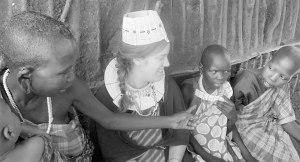 After long days in the hot African sun, I would retire to the safety of my small tent for the night. As I would rest my head against a pile of clothes that doubled as a pillow—it was clear by the sounds outside my tent that the world in which I was living was not yet ready to call it a day. Bats screeched as they flew above, roaring lions carried from miles away, and hyenas whooped in celebration in the nearby bushes. Many other unidentifiable sounds colored my imagination as I would drift into sleep, thinking about the vastness of the unknown world.
After long days in the hot African sun, I would retire to the safety of my small tent for the night. As I would rest my head against a pile of clothes that doubled as a pillow—it was clear by the sounds outside my tent that the world in which I was living was not yet ready to call it a day. Bats screeched as they flew above, roaring lions carried from miles away, and hyenas whooped in celebration in the nearby bushes. Many other unidentifiable sounds colored my imagination as I would drift into sleep, thinking about the vastness of the unknown world.
Last spring, I studied abroad in the east African country of Tanzania. Tanzania is a vibrant country that is rich in culture and filled with renowned wildlife. While in Tanzania, I studied the human-wildlife interface conflict present between the local communities. I also studied the efforts established by outside establishments to conserve the mega-fauna in Tanzania. Conflicts arise around the limitations of the national parks in terms of land use and the role mega-fauna play in the culture of the Tanzania’s many tribes. While studying wildlife, I toured six of Tanzania’s many protected areas in Jeeps with pop-up roofs, observing everything from elephants and lions to crowned cranes and yellow-collard lovebirds.

I was also able to experience the hard-working life of Tanzanians in both an urban setting and in a rural tribe. In Tanzania, there are more than 120 ethnic tribes and more than 120 different cultures and ways of life. I stayed with a family in a village outside Arusha, one of the more urban areas in the country. We would cook over a wood fire in a wooden shake outside of the three-room cement house. Twelve people lived in our humble house with four twin-sized beds. The females of the family would spend the day cooking, cleaning, practicing subsistence farming, and collecting fire wood. A typical meal would consist of rice or ugali, a firm paste made of corn flour, and beans with a side of cooked spinach-like vegetables. Every day-to-day activity that I am adequately proficient at in the United States, I was less than sufficient at in Tanzania. Every article of clothing I would wash by hand would get rewashed by my 10-year-old sister. Every time I helped prepare a meal, my older sister would run out of patience and stop me halfway through my vegetable chopping to complete the task three times faster. The cleanliness of my feet was inspected after every bucket shower and given poor marks by my mother. My aunt would endlessly scold me for my inability to speak fluent Swahili after less than a week of language lessons. Adjusting your way of life is always difficult and takes some time to become proficient again, whether you are transitioning between the United States and a country in Africa or from your parents house to college. However, with time, proficiency hopefully comes. One of my proudest moments was when I was cooking chapatti—a type of fried flat bread—and after many failed attempts, I received a “very good” by my mother.
I was only able to experience a small bit of the diversity of cultures in Tanzania. There is still so much unknown left for me to discover. Studying abroad was a fantastic way to experience more than you will ever be able to learn in the classroom. Of all the things I learned last semester, a reoccurring lesson was how much I do not know.
Mary,
It sounds like you had an amazing experience in Tanzania–and that you were able to experience a part of the culture that other tourists might not be able to. Kudos to you for mastering the chapatti! I’d love it for you to write about your experiences for Pink Pangea (www.pinkpangea.com), the magazine for women travelers. Thanks!
African people are more hardworking people. The standard of living of this need to increase. Thanks for sharing nice information about Tanzania region. I hope they will have great live in coming days.
Thanks & Regards,
Jack Thomas